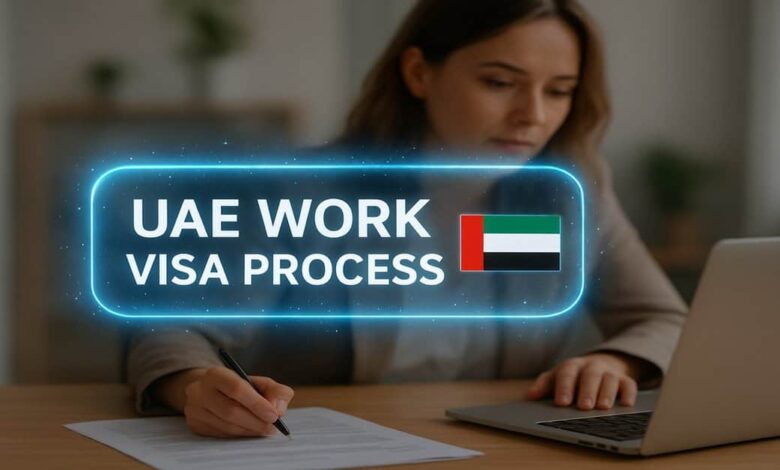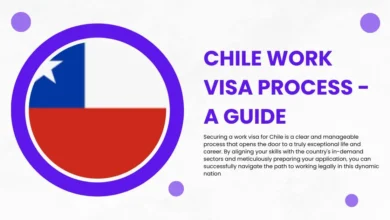UAE Work Visa Process 2026 – Application Process

Moving to a new country for work is exciting, but it can also feel overwhelming. A UAE work visa is more than just a legal document; it’s your key to starting a new chapter in a vibrant, multicultural country. With the right visa, you can live and work and even bring your family along, all while enjoying a tax-free salary, world-class infrastructure, and opportunities for career growth.
Imagine building your dreams in a city where innovation meets tradition, and every day brings the chance to learn, grow, and connect with people from around the globe.
Work Visa in UAE:
A UAE work visa is an official government document that grants foreign nationals the legal right to live and work in the UAE. The work visa’s duration may vary based on the type of visa, ranging from two years to five years, and the visa is typically sponsored by the employer. The work visa is essential for individuals to remain employed and carry out business activities within the UAE.
Benefits of UAE Work Visa Process
- Legal Employment:
A work visa allows you to work legally in the UAE, ensuring compliance with the country’s labor and immigration laws. - Tax-Free Income:
The UAE does not impose income tax, which means expatriates can save a significant portion of their earnings. - High-Paying Jobs:
The UAE offers competitive salaries in sectors such as finance, technology, healthcare, construction, and hospitality. - Residency Rights:
A work visa typically comes with a residency permit, allowing the worker to stay in the UAE for the duration of their employment. - Modern Infrastructure:
The UAE provides access to world-class infrastructure, including transportation, healthcare, and entertainment. - Career Growth:
The UAE is home to many multinational companies, offering opportunities for career development and skill enhancement. - Family Sponsorship:
Work visa holders can sponsor their family members for residency in the UAE. - Pathway to Long-Term Residency:
Certain work visas, like the Green and Golden Visas, allow employees to transition to long-term residency or even citizenship. - Multicultural Workforce:
The UAE has a diverse expatriate population, which contributes to a dynamic and multicultural work environment.
Types of Work Visas:
The UAE offers several types of work visas, each with different features depending on the applicant’s employment status, qualifications, and profession.
1. Standard Work Visa
- Validity: 2 years (renewable).
- Employer Sponsorship: This visa is employer-sponsored, meaning you can only work for the employer who sponsors the visa.
- Eligibility: Most commonly issued to employees in private, government, or free-zone sectors.
2. Green Visa
- Validity: 5 years (renewable).
- Employer Sponsorship: No employer sponsorship is required for this visa, offering greater flexibility in terms of employment and residency.
- Eligibility: Issued to skilled workers, freelancers, business owners, and investors. It provides more freedom, as it does not tie the worker to a single employer. Key Requirements:
- Freelancers/Self-Employed: Must prove freelance authorization, have a bachelor’s degree, and earn a minimum of AED 360,000 annually.
- Skilled Workers: Must have a monthly salary of at least AED 15,000, possess a bachelor’s degree or equivalent, and be classified in skill levels 1, 2, or 3.
3. Golden Visa
- Validity: 10 years (renewable).
- Eligibility: Primarily for investors, highly skilled professionals, entrepreneurs, researchers, and individuals who contribute significantly to the UAE’s economy. Key Requirements:
- Investors: Must invest a minimum of AED 2 million in real estate or other ventures.
- Entrepreneurs: Businesses with a valuation of at least AED 500,000.
- Specialized Professionals: Includes researchers, doctors, scientists, and other highly skilled individuals.
Work Visa with Family:
A UAE work visa with family allows expatriates to sponsor dependents, including spouses and children, to live in the UAE. Eligibility typically depends on the employee’s salary and job type. Sponsors must provide proof of employment, accommodation, and financial stability. Family visas enable expatriates to reside and work legally while keeping their family together.
Medical Fitness for Work Visa:
UAE medical fitness for work visas requires applicants to undergo a health check, including tests for infectious diseases and general health screening. A medical certificate is mandatory for visa approval. Accurate results and timely submission are essential. Medical clearance ensures workplace safety and compliance with UAE regulations.
Emirates ID for Work Visa:
The UAE Emirates ID for a work visa is issued to all expatriates holding a residence visa. It serves as an official identity card for government and private services. Applicants must provide personal and biometric information. Possession of an Emirates ID is essential for legal residence, banking, and healthcare access.
Residence Visa for Work:
UAE residence visa for work allows expatriates to live and work legally in the UAE. The visa is typically sponsored by an employer and requires submission of employment contracts, medical clearance, and an Emirates ID application. Valid residence visas enable long-term employment and access to public services.
Eligibility Criteria for UAE Work Visa Process
The eligibility for a UAE work visa is based on several key factors:
- Age: You must be at least 18 years old.
- Education: Depending on the visa category, you will need to meet the educational qualifications:
- Category 1: Bachelor’s degree holders.
- Category 2: Holders of post-secondary diplomas.
- Category 3: High school diploma holders.
- Valid Passport: Your passport must be valid for at least 6 months.
- Medical Clearance: You must pass a medical examination for infectious diseases such as tuberculosis and HIV.
- Employer’s Business License: The employer must hold a valid business license to sponsor foreign workers.
- Health Insurance: Employers are legally required to provide health insurance to all employees.
Required Documents:
To apply for a work visa, you will need to provide the following documents:
- Valid Passport: The passport must be valid for at least 6 months.
- Passport-Size Photos: Typically 43 mm x 55 mm or 2 inches by 2 inches.
- Emirates ID: The Emirates ID is mandatory for all residents in the UAE, including expatriates.
- Entry Permit from the Ministry of Labor: This is typically handled by your employer.
- Medical Test Results: A clearance certificate showing you are free from infectious diseases.
- Employer’s Commercial License: A copy of the employer’s business license.
- Employment Contract: A signed contract between the employee and the employer.
How to Apply for UAE Work Visa Process
Here’s a step-by-step guide to the UAE work visa application process:
- Employer Submits Application: The employer applies to the Ministry of Labor (MOL) for the work permit.
- Entry Permit: Once the Ministry of Labor approves the application, the employer can apply for an entry permit, which allows the worker to enter the UAE legally.
- Medical Test: After arrival in the UAE, the worker undergoes a medical examination to check for diseases like HIV, tuberculosis, and hepatitis.
- Emirates ID Registration: Upon passing the medical tests, the employee must apply for the Emirates ID.
- Residence Visa Issuance: The employee’s residence visa will be processed, allowing the employee to live and work in the UAE.
- Visa Stamping: The work visa is no longer stamped in the passport. Instead, it is electronically linked to the Emirates ID, which serves as the official record of the visa status.
Visa Processing Time and Fees:
- Processing Time: Typically, it takes 5-7 business days for the Ministry of Labor to issue the work permit, after which the work visa and residence visa can be processed.
- Visa Fees: The fees can range from AED 3,000 to AED 7,000 depending on the type of visa and additional requirements (e.g., medical tests, Emirates ID).
Fee Breakdown:
- Permit Application Fee: AED 100
- Issuance Fee: AED 100 per year
- Government/Private Sector Processing Fee: AED 150
Conclusion:
A UAE work visa opens the door to legal employment, tax-free income, and career growth in a dynamic, multicultural environment. It allows expatriates to live with their families, access healthcare, and enjoy modern infrastructure. With clear eligibility and a straightforward application process, working in the UAE is both secure and rewarding.
Frequently Asked Questions:
How long does it take to process a UAE work visa?
The processing time typically ranges from 5 to 7 business days after submitting all required documents.
What is the cost of a two-year employment visa in the UAE?
The cost for a two-year employment visa typically falls between AED 3,000 and AED 7,000, depending on the type of visa, medical tests, and Emirates ID processing.
How much bank balance is required for a Dubai visa?
A minimum balance of AED 5,000 for a two-month visa, or AED 3,000 for a three-month visa.




